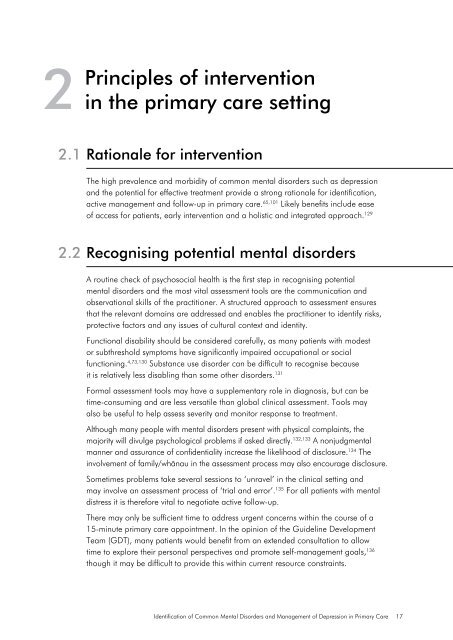Common Mental Disorders Depression - New Zealand Doctor
Common Mental Disorders Depression - New Zealand Doctor
Common Mental Disorders Depression - New Zealand Doctor
Create successful ePaper yourself
Turn your PDF publications into a flip-book with our unique Google optimized e-Paper software.
2<br />
Principles of intervention<br />
in the primary care setting<br />
2.1 Rationale for intervention<br />
The high prevalence and morbidity of common mental disorders such as depression<br />
and the potential for effective treatment provide a strong rationale for identification,<br />
active management and follow-up in primary care. 65,101 Likely benefits include ease<br />
of access for patients, early intervention and a holistic and integrated approach. 129<br />
2.2 Recognising potential mental disorders<br />
A routine check of psychosocial health is the first step in recognising potential<br />
mental disorders and the most vital assessment tools are the communication and<br />
observational skills of the practitioner. A structured approach to assessment ensures<br />
that the relevant domains are addressed and enables the practitioner to identify risks,<br />
protective factors and any issues of cultural context and identity.<br />
Functional disability should be considered carefully, as many patients with modest<br />
or subthreshold symptoms have significantly impaired occupational or social<br />
functioning. 4,73,130 Substance use disorder can be difficult to recognise because<br />
it is relatively less disabling than some other disorders. 131<br />
Formal assessment tools may have a supplementary role in diagnosis, but can be<br />
time-consuming and are less versatile than global clinical assessment. Tools may<br />
also be useful to help assess severity and monitor response to treatment.<br />
Although many people with mental disorders present with physical complaints, the<br />
majority will divulge psychological problems if asked directly. 132,133 A nonjudgmental<br />
manner and assurance of confidentiality increase the likelihood of disclosure. 134 The<br />
involvement of family/whänau in the assessment process may also encourage disclosure.<br />
Sometimes problems take several sessions to ‘unravel’ in the clinical setting and<br />
may involve an assessment process of ‘trial and error’. 135 For all patients with mental<br />
distress it is therefore vital to negotiate active follow-up.<br />
There may only be sufficient time to address urgent concerns within the course of a<br />
15-minute primary care appointment. In the opinion of the Guideline Development<br />
Team (GDT), many patients would benefit from an extended consultation to allow<br />
time to explore their personal perspectives and promote self-management goals, 136<br />
though it may be difficult to provide this within current resource constraints.<br />
Identification of <strong>Common</strong> <strong>Mental</strong> <strong>Disorders</strong> and Management of <strong>Depression</strong> in Primary Care 17

















